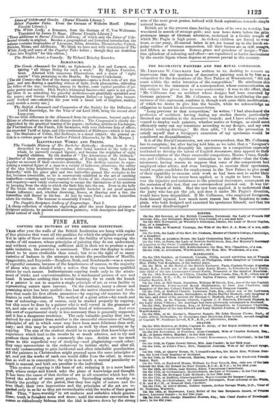THE DECORATIVE PAINTERS AND THE ROYAL COMMISSION.
Mr. LEONARD W. CoLLstaxs has written to us, desiring to remove an impression that the specimen of decorative painting sent in by him as competitor for the decorations of the New Palace at Westminster, "did not come within the strict intention of the competition." He attributes this impression to the statement of a correspondent, whose communication OR this subject has given rise to some controversy: it was to the effect, that " Mr. Collmann was an architect whose designs had been executed by German painters." But Mr. Collmann, so far from invalidating the cor- rectness of this statement, confirms it, though with some little modification; of which we desire to give him the benefit, while we acknowledge an obligation to insert his advertisement-letter.
"Long previous to that competition," he writes, "I had abandoned the profession of architect, having during my studies therein particularly directed my attention to the decorative branch; and I have always endea- voured to employ such painters, whether native or foreign, as could most efficiently carry out my intentions according to my designs, and my OWR detailed working-drawings." He then adds, "I took the precaution 1:0 satisfy myself that a foreigner's execution of my specimens would be considered no disqualification."
It is of the RoyalCommission, not our correspondent, that Mr. Colima= has to complain; for, after having told him, as we infer, that a "foreigner's execution" would not disqualify his specimens in a competition expressly instituted to develop the talent of English decorators, they append to their recommendation of the three successful competitors, Messrs. Crake, Goodi- son, and Collmann, a significant intimation to this effect—that the Com- missioners, having reason to suppose that some of the competitors had employed other artists, and even foreigners, to execute their specimens, would require candidates for employment in the New Palace to give proof of their capability to execute such work as had been sent in under their names. This test has never been applied, as it ought to have been. It was the injustice and unfairness to the practical decorators, consequent On the omission of this test, that our correspondent pointed out. It was vir- tually a breach of faith. Had the test been applied, it is understood that the party who has got the job, and does it under Mr. Pugin's direction, would have been disqualified. If Mr. Collmann, who employed foreigners, feels himself injured, how much more reason has Mr. Goodieon to can- plain, who both designed and executed his specimens himself, fuld that too under many disadvantages?


























 Previous page
Previous page